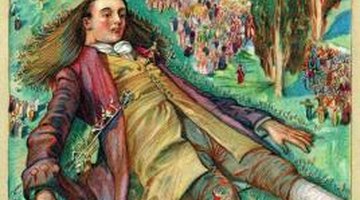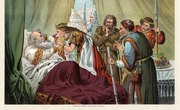Satire is an often indirect way to poke fun at or condemn societal problems and people. Often, the use of irony, humor and sarcasm are satirical elements that illuminate social ills and speak against them. Historically, satire was used in literature as a safe way to criticize governments and political establishments. When cast in a humorous light, political criticism wouldn’t likely end in execution.
Satire Defined
Satire is simply the use of humor and/or irony to criticize or expose social customs, practices and political systems. Satire can be found in fiction, plays and films. There are many instances of satire in English literature that have piqued the interest of readers and made them think about the vices and problems of the age. Although many works of literature contain satirical elements, there are novels and plays that are classified wholly as ‘satires.’
Early Works
Early works, such as those by Chaucer and Shakespeare, were often satirical. Chaucer’s “The Canterbury Tales,” is a satire that criticizes aspects of the church and society. One of the most famous tales, ‘The Wife of Bath’s Tale,’ is a satire on the treatment of women in the Church and society. While she has had five husbands and is sexually experienced, the wife of Bath is also unique for that time period in that she doesn’t feel ashamed of her life. In a time when a woman who wasn’t a virgin on her wedding night was shamed and ostracized, she was not. In this way, Chaucer’s tales satirized many of the social and political norms of his day. Shakespeare is widely known for his comedies and tragedies, but his works are also satirical in nature. While many of his historical plays satirize the politics of the day, even his poetry, like Sonnet 130, pokes fun at over-the top descriptions of beauty and love in poetry. “My mistress' eyes are nothing like the sun,” isn’t literally degrading his lover’s eyes, but showing how a lofty comparison like this is overused by poets and loses its meaning.
Gulliver's Travels
One of the most famous and recognizable satires in English literature is "Gulliver’s Travels" by Jonathan Swift. His juxtaposition of refined horses and barbaric humans is a profound satire on the base nature of humanity. In this satirical novel, Gulliver, after his business fails, sets off to sea and encounters several lands. There are lands where the people are miniscule and there are lands where the people are huge, but each place is a particular satire on the state of affairs in England and its customs and politics. When Gulliver reaches the land where horses are educated and humans are barbaric, he learns to appreciate the horses and returns home where he has difficulty living among his own kind. Gulliver “entered on a firm resolution never to return to human Kind, but to pass the Rest of [his]Life among these admirable Houyhnhnms in the Contemplation and Practice of every Virtue.”
Effects
While the initial effect of satire on readers is humorous, the desired effect is one that authors of satire give much prior thought to. Using humor to censure and ridicule those in powerful positions was often risky, but necessary. The end result caused audiences and readers to think critically about the political and social practices of the day.
Related Articles
References
Writer Bio
Stacy Alleyne is a certified English teacher with a BA in English and graduate work in English, education, journalism and law. She has written numerous articles and her own dining column for the "Gazette."











